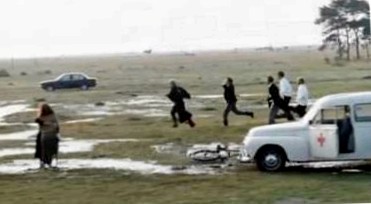The russian filmpet andrej tarkowski died 25 years ago — and hill the insights of a unusavienced
Smooth black hair, the face closed to the left hand, the look doubtfully directed into an imaginary distance: a russian stamp of 2007 shows the director grublerisch, as a heavy thinker. A souvenir in tristesse? Andrej arsenevich tarkowski, so his full name, died on 29. December 25 years ago in paris on cancer. He was only 54 years old; his films are considered timelessly terrific.
Seven works brought the master under the people, although he did not like the people as a mass of indiscriminate consumers:
It is impossible to correlate years of work and these one and a half hours of spending in the cinema. There are spectators who want to understand everything in these one and a half hours. But immediately and suddenly it’s impossible! Not randomly one of the most famous writers said: "it’s just as hard to read a good book as to write it."
A. Tarkowski, during a meeting with his fans in estonia
With the "well-known writer" he will have meant the german friedrich schiller. His own credo fails the cicerone of the most advisable cinema into the words: "man would like to strive to understand the art, and the art should not go down to the level of mass production." basta. In germany, the tarkowski reception continuously sat down "stalker" (1979). In the laconic conclusion of cinema, that’s how it reads: "duster presentation of human limits."

stalker
The cult of the pictures is the secret that considers his sympathizers; tarkowski is considered "lonely solitar", he is and remains, probably never become one who delights the multiplex community of our days. His cinematicity is at best in the program cinemas of some city. After a suggested prophecy boris pasternaks, there were 7.5 films.
The young tarkowski had my own memories met the spirit of the famous literacy and had interviewed him according to the prospects. "Why only so few?", wanted to know the budding filmmaker. Pasternaks information clearly fell out: a few films — for that good.
Fern and foreign as the mars
Pasternak hin, pasternak — pretty much so did it. The adept eliminated the olympus of the international cinema with a merry will, one pays today, as i said, seven directorial work on the main population of his legacy. Dafur received tarkowski mannigfachen awards, including the contested title "folk artist russia" (1980), but he was a stranger not only in his own, the russian home. An outdoor manager also of the pan-european culture and life form, which he remained connected by manifold quotes, whose iconographic modes and traditions, starting from the renaissance, carry out his films like objective and at the same time advisable lifelines. Because europe is probably spiritual domicile, but at the same time it is also a stranger and far as the mars; so it sounds at least from the mouth alexander in a scene "victim" (1986), if the aging protagonist looks at a birthday present: a historical card in europe.
How beautiful must that have been when they believed the world was as shown here. This europe here is like the planet mars, which is called, it has nothing to do with the truth.
Alexander, played by erland josephson, in: "victim"
He, a reflection of the filmmaker himself, inspects her kneeling, cowering, admit her like a fantastic stucco counterworld, like an absurd cosmos: the european map, "an original"! And then: in a qualifying slow camera ride — again: it’s about europe — it goes away from the seclusion of the schareninsel, on which alexander spends his old age, towards a gross city. The fantastic movement follows the spotted overrides of a whole ruined civilization.

Victim
Pictures like a nuclear war. Triste water laughing, packaging mull, a broken chair. Celebrated slowness. An autowrack lies on the side as a slaughtered animal, dead, machine-mabigous innards emerge like guts. Tarkowski plays with the hopelessness of a broken world, which is no longer curable. Nothing is holy anymore.
Is it melancholy?
Probably also. In the classification of his art in the long stream of civilizational (un) time, starting from renaissance and baroque, in the population and quotes of emblem art of the 17. And 18. Century, for example, recognizes the cultural scientist hartmut bohme tarkowski "melancholic allegorism". Bohme states and describes tarkowski’s unique heavy-spirited virtuositat, its exercise talent, "arrange civilization processes and objects in images of decay". Who can do that like tarkowski?
Strange, fantastic, irreal, that’s his planet. You do not have to fly to mars to meet this ruffled eiland. It is called russia (as in "andrej rubljow", 1966 — 69), europe (as in "victim", 1986), solaris as in the eponymous film (1972) or simply the zone (as in "stalker", 1979). It is always one thing: an uncomfortable cosmos, consisting of violence and kennelis. "We use the microscope like a crunch", rashed alexander cute. "We transform any scientific progress directly into something boses."

solaris
The civilization process in the state of continuous demoralization. At tarkowski, modern culture is also one "civilization of the prostheses", an order that people — he probably calls him the "average people" — systematically cut off from reflection. Man in this culture, which is a unkultur in its innermost hiding place, suffers the loss of "save and eternal". Thus tarkowski1 doubt the project of modern superposition.